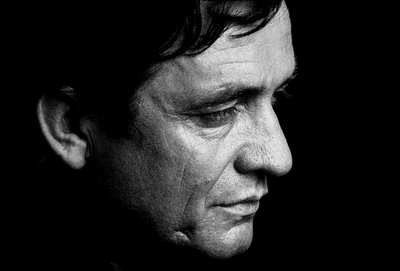A Man Named Cash

"He knows how to fill up a room. Elvis Presley had it. Bob Dylan has it. Geronimo probably had it. Jesus Christ had it. Johnny Cash has it." -- Marty Stuart.
While we await the outcome of the Oscar race and the fate of the critically-acclaimed biopic Walk the Line, starring Joaquin Phoenix as the legendary singer/songwriter Johnny Cash, let us take a moment to recall Cash himself, who was born on this day in 1932 in Kingsland, Arkansas. The real thing is always better than an imitation.
Although thought of primarily as a country musician, the "Man in Black," Johnny Cash, stands as an arresting and influential figure in the pantheon of pop music, a member of both the Country Music Hall of Fame (the youngest inductee at the time) and the Rock ‘n Roll Hall of Fame. With his mighty, sonorous baritone sounding like one’s father just before a whipping, rambling over a lean guitar line, Cash’s music at its best is basic and pure.
He liked to write songs as a teen, growing up in Depression-scarred Arkansas, but it wasn’t until after high school, when he was serving in the Air Force in the early 1950s, that he bought his own guitar and began to think seriously of music as a career. After leaving the USAF, he showed up at Sam Phillips' Sun Studios in Memphis in 1955, where he was offered a contract and sidled up to other Sun stablehands Roy Orbison, Carl Perkins, Jerry Lee Lewis and Elvis Presley. His informal sessions with Perkins, Lewis and Presley were later released as The Million Dollar Quartet, but Cash established himself as a solo artist from the start, with rockabilly hits "Cry, Cry, Cry," "Folsom Prison Blues," and "I Walk the Line," all 3 of which were top country hits with some cross-chart appeal during 1955-56.
He stood out like a vulture at a tea party wearing all black at the Grand Ole Opry while the other stars were decked out in rhinestones in 1958, but he was encountered as a refreshingly authentic and unadorned persona by the fans. By the early 1960s he was playing 300 shows a year around the country, and to keep himself from collapsing from exhaustion he developed an amphetamine habit which alienated him from his first wife. With Columbia Records he was branching out musically, recording gospel tunes and concept albums on railroad songs and Native Americans, but his personal life was a shambles (including scrapes with the law over starting a forest fire and smuggling pills) until he married June Carter in 1968 and returned to his fundamentalist Christian roots.
Carter had written one of his best known songs for him, the endlessly transformable anthem of self-conscious co-dependence, "Ring of Fire" (1963). The rejuvenated Cash was ubiquitous at the end of the 1960s, with a successful TV variety series, a hit concert LP and documentary Johnny Cash at San Quentin (1969, featuring his biggest hit, "A Boy Named Sue," written by Shel Silverstein), an appearance on Bob Dylan’s Nashville Skyline album (also 1969), a part in The Gunfighter (1970) with Kirk Douglas, and a concert with John Williams and the Boston Pops. During the 1970s, his popularity declined somewhat, but he remained busy as a social activist, campaigning for prison and Native American reforms as well as working with evangelist Billy Graham. The 1980s found him teaming up with old cronies to moderate success, with Perkins and Lewis as The Survivors (1982) and with Waylon Jennings, Willie Nelson and Kris Kristofferson as The Highwaymen (1985 and 1992).
He unleashed a masterpiece in 1994 with American Recordings, the first of 4 projects with producer Rick Rubin -- a stirring acoustic collection of his own songs and selections from Tom Waits and Leonard Cohen which opened the ears of a new generation to his sepulchral, apocalyptic murmurs, as well as to his avuncular warmth and humor. By the end of his run with Rubin, he was making evocative, off-genre acoustic covers of such recordings as Beck's "Rowboat," U2's "One Love," Depeche Mode's "Personal Jesus" and Nine Inch Nails' "Hurt" -- the latter of which was the subject of an MTV-VMA-nominated video by Mark Romanek.
Cash, beset by Parkinson's Disease, diabetes and heart troubles near the end, died 4 months after the death of his beloved June, on September 12, 2003 in Nashville, Tennessee.
Labels: Classic Pop Music





2 Comments:
Didn't realize that Cash attended college. Where did he attend?
Actually, there's been a bit of confusion on this point in his publicity. A lot of broadsides claim that Cash graduated from college in 1950, but in interviews Cash states that there was no money for college, which is why he joined the Air Force. The latter seems to be correct.
Post a Comment
Subscribe to Post Comments [Atom]
<< Home